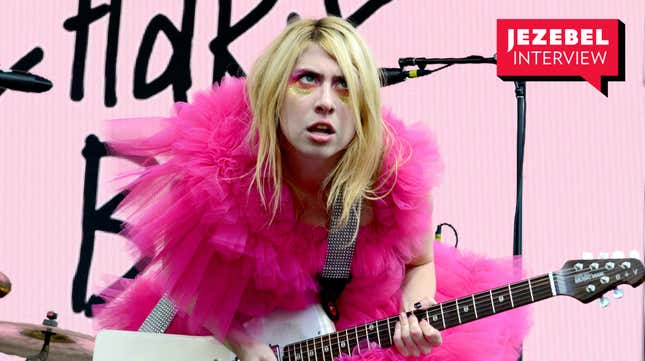
In 2019, Charly Bliss switched from the sarcastic garage-rock of the band’s debut album Guppy to the bright-eyed power-pop of its sophomore album Young Enough. From a pit stop in Toronto, as the band neared the end of a tour, lead singer-songwriter Eva Hendricks explained to Jezebel, “I wrote Guppy at a time where I was very emotionally unstable, and I am very proud of that record, but I’m more proud of Young Enough.”
Collectively, Young Enough soundtracks the rise and fall of crushes and relationships that feel doomed, shining a light on painful events (the euphoric “Chatroom” tackles Hendricks’s experience with sexual assault). The album is, in many ways, a testament to distance and perspective. “I’ve become a better writer the happier and more fulfilled I am,” Hendricks says.
The hyper-polished, synth-driven numbers on Young Enough are brimming with equal parts rage and joy. It’s a masterclass in songwriting, which is why their new EP Supermoon, composed of songs the band recorded at the same time as Young Enough, adds a wrinkle to the creative process. While Young Enough is about processing trauma and growing up, Supermoon shows the messiness behind doing so.
Hendricks talked about the methods and madness of Charly Bliss in a phone interview, condensed and edited here for clarity.
JEZEBEL: Young Enough was such a strong artistic statement that signalled a new direction for the band. Why release Supermoon so soon after?
EVA HENDRICKS: It was a tough decision for me, to be honest. Because of exactly what you said. On Young Enough, we wanted to feel like we were making the best record possible and chose the songs that told the story in the clearest and most concise way. Part of that was that we went into the studio and recorded more songs than we would need, and whittled it down to 11 tracks for the album—but we had these extra songs left over and weren’t sure what to do with them. [Releasing Supermoon] felt like a nice way to put a period at the end of the album cycle for Young Enough and show our fans where we thought we were going. But I’m a perfectionist, it’s pretty hard for me to release music that’s not my favorite of what we’ve written. [Laughs]
To me, it felt a bit like getting a peek into the songwriting process for Young Enough.
Yeah, that’s what I was hoping for. But it’s tough. [Laughs] I only want to release the best stuff!
You’ve cited Lorde’s Melodrama and Superorganism’s debut album as influences on Young Enough. Did you think of this album as a sort of manifesto or a way to reintroduce yourself to fans?
-

-

-

-

-

-

-

-

-

-

-

-

-

-

-

-

-

-

-

-

-

-

-

-

-

-

-

-

-

-

-

-

-

-

-

-

-

-

-

-








































